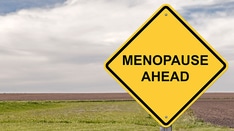Disrupted sleep during the transition to menopause appears to be associated with an increased risk for carotid atherosclerosis, investigators report.
"In our study, shorter sleep time and poor subjective sleep quality were linked to significantly higher odds of carotid plaque in pre- and postmenopausal women," said Rebecca Thurston, PhD, professor of psychiatry at the University of Pittsburgh.
"At this point, we don't know if these are causal associations, but if they are, there are several effective interventions to improve sleep, from pharmaceutical agents, to cognitive behavioral therapy for insomnia, to practicing good sleep hygiene," she told Medscape Medical News.
The results of the study were presented at the North American Menopause Society 2016 Annual Meeting in Orlando.
Dr Thurston and her team assessed 256 peri- and postmenopausal women who had an intact uterus and at least one ovary. The study participants were 40 to 60 years of age, did not smoke, did not work the night shift, and had no history of clinical cardiovascular disease.
None of the women were taking medications for sleep or hot flashes, and none were taking drugs that could affect the cardiovascular system, such as beta blockers, calcium-channel blockers, ACE inhibitors, or insulin.
Each woman wore an actigraph device on her wrist for 3 days to monitor sleep, and each underwent 24 hours of ambulatory sternal skin conductance hot-flash monitoring.
All study participants completed the Pittsburgh Sleep Quality Index (PSQI) and underwent a carotid ultrasound to assess intima media thickness (IMT) and plaque. A blood draw was used to assess lipid, glucose, insulin, and estradiol levels in each woman.
The investigators found that a shorter objective sleep time was associated with significantly higher odds of carotid plaque (odds ratio, 1.58; 95% confidence interval, 1.11 - 2.27).
There was also a nonlinear relation between objective sleep time and IMT. However, sleeping more than 7 hours was not protective.
Table. Relation Between Sleep Time and Intima Media Thickness
| Sleep Time, hours | IMT, mm |
| 5–6 | 0.70 |
| 6–7 | 0.66 |
| >7 | 0.68 |
Subjectively poorer quality of sleep was associated with significantly thicker IMT and with more plaque.
These associations remained after covariates, including estradiol, depressive symptoms, and sleep hot flashes, were considered, Dr Thurston reported.
Physicians should routinely ask women in midlife about their sleep, she added.
"A lot of times, this is not necessarily on the radar screen of physicians, but both patients and providers should know that sleep issues during the menopause transition are not something that women should ignore or suffer through, thinking that nothing can be done. There are interventions to try," she explained.
This important correlational study showed that "as women's reports of sleep and their actual sleep worsened, their cardiovascular disease risk also worsened," said Janet Carpenter, PhD, from the Indiana University School of Nursing in Indianapolis.
Although this study does not allow us to infer cause, it demonstrates that "poor sleep at menopause and poor cardiovascular health go hand in hand," Dr Carpenter told Medscape Medical News.
The study was sponsored by the National Institutes of Health and National Heart, Lung, and Blood Institute. Dr Thurston and Dr Carpenter have disclosed no relevant financial relationships.
North American Menopause Society (NAMS) 2016 Annual Meeting: Abstract S-16. Presented October 7, 2016.
Medscape Medical News © 2016 WebMD, LLC
Send comments and news tips to news@medscape.net.
Cite this: Poor Sleep Linked to Atherosclerosis in Midlife Women - Medscape - Oct 12, 2016.











Comments